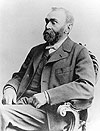The legacy of Alfred Nobel
Champagne corks will pop, phones will ring wildly, and once obscure academics will suddenly find themselves the object of a two-day media frenzy.

The brain behind the Noble Prize.
